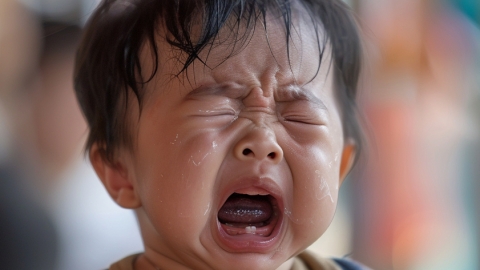What causes nosebleeds in children during the night?
Generally, a child's nosebleed at night may be caused by dry night air, picking the nose before bedtime, allergic rhinitis, vestibular rhinitis, or thrombocytopenic purpura. If discomfort occurs, it is recommended to seek medical attention promptly. A detailed analysis is as follows:
1. Dry Night Air
During nighttime sleep, if the room is not ventilated and no humidifying measures are taken, the air can become dry. A child's nasal mucosa may continuously lose moisture, and once the mucosa becomes dry and brittle, blood vessels are more prone to rupture and bleed. Before bedtime, a humidifier can be placed in the room to maintain humidity at 50%-60%. Additionally, a child-specific saline nasal spray can be gently used to spray the nasal cavity before bedtime, keeping the mucosa moist. Encourage the child to drink an appropriate amount of warm water before bedtime.
2. Picking the Nose Before Bedtime
Some children may unconsciously pick their noses before bedtime. Although the act of picking may occur before sleep, the damaged nasal mucosa may bleed at night due to changes in body position or slight irritation. Parents should pay attention to the child's condition before bedtime and promptly stop this behavior. Providing toys to distract the child can help. If minor damage to the nasal mucosa is noticed, a small amount of erythromycin ointment can be applied under a doctor's guidance to promote mucosal healing.

Children with allergic rhinitis may come into contact with allergens such as dust mites in bedding or fibers from bedding materials at night, causing nasal mucosal edema and itching. The child may unconsciously rub their nose during sleep, leading to mucosal damage and bleeding, often accompanied by nasal congestion and sneezing. Regularly clean bedding, washing sheets and covers weekly in hot water to kill dust mites, and choose cotton bedding materials. Use medications under a doctor's guidance, such as cetirizine hydrochloride drops, loratadine syrup, mometasone furoate nasal spray, etc., to relieve allergic symptoms.
4. Vestibular Rhinitis
Vestibular rhinitis is often caused by nasal secretions irritation or nose picking. Nasal secretions tend to accumulate in the vestibule of the nose at night, irritating the inflamed area, leading to mucosal erosion and bleeding, which may be accompanied by nasal pain and a sensation of heat. Keep the child's nasal cavity clean; if secretions are present, gently clean them using saline-soaked cotton swabs. Apply medications under a doctor's guidance, such as erythromycin ointment, mupirocin ointment, fusidic acid cream, etc., to control inflammation. Correct the child's habit of picking the nose to prevent worsening of the inflammation.
5. Thrombocytopenic Purpura
Thrombocytopenic purpura leads to a reduced platelet count and impaired coagulation function. Children may experience nosebleeds at night without obvious cause, often with prolonged bleeding time, and may also have symptoms such as skin bruising and gum bleeding. Once such symptoms appear, promptly take the child to see a doctor. Medications such as prednisolone tablets, dexamethasone tablets, or intravenous immunoglobulin may be used under a doctor's guidance. Daily precautions should include avoiding injuries, maintaining a light diet, and regular follow-up blood tests.
In daily life, ensure indoor air circulation and regularly clean the child's bedding. Encourage the child to develop good hygiene habits and avoid picking the nose before bedtime. Follow medical advice for care. If the child experiences frequent nosebleeds at night, heavy bleeding, or other abnormal symptoms, seek medical attention promptly.









